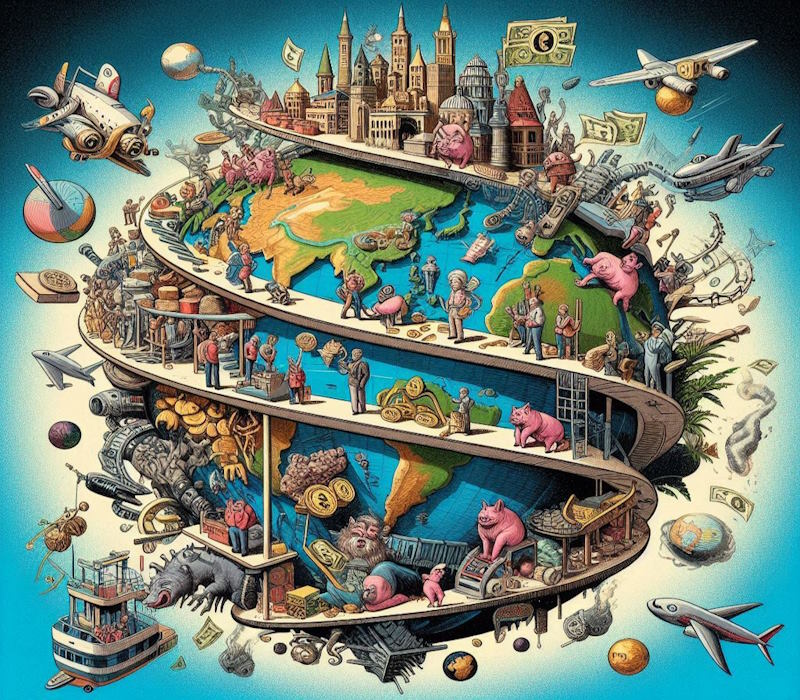How the Global Economy Became One Big Ponzi Scheme:
In today’s world, it feels increasingly difficult to afford basic things like buying a house, saving for the future, or even keeping up with everyday expenses. Despite technological advancements and reports of economic growth, many people—especially younger generations—feel financially stuck. Why is this happening?
The short answer: the global economy has become unsustainably fragile. It's propped up by debt, endless money printing, and central bank interventions, creating an economic illusion where asset prices rise, but real wages and opportunities don’t. Essentially, the system is behaving like a giant Ponzi scheme, benefiting those who already have wealth while leaving everyone else struggling. In this blog post, we’ll unpack how this system works, why it’s unsustainable, and what could happen next.
The Debt Cycle: A System Built on Borrowing: https://www.usdebtclock.org
The 2008 financial crisis was a major wake-up call for the world. A housing bubble fuelled by cheap credit burst, leading to a global recession. Governments and central banks rushed to prevent total collapse by lowering interest rates and using a policy called quantitative easing (QE). This involved central banks buying government bonds and other financial assets, injecting liquidity into the financial system to prop up markets. In theory, this would boost investment and spending.
However, the core problem wasn’t fixed. Real wages have stagnated for decades. According to the Economic Policy Institute, inflation-adjusted wages for the median U.S. worker have barely grown since the 1970s. To maintain their standard of living, people began relying more and more on debt. Credit cards, student loans, and mortgages allowed people to keep spending, but this debt-fuelled economy is inherently fragile.
In the U.S. alone, household debt hit a record $17 trillion in 2023. Global debt has reached $290 trillion, surpassing 256% of global GDP. This means we’re borrowing far more than what the world produces in goods and services each year. The reliance on debt creates an unstable situation where any economic shock—whether it’s a pandemic, war, or inflation spike—can trigger a cascading financial crisis.
Quantitative Easing and the False Sense of Wealth:
After the 2008 crisis, central banks, particularly in the U.S., Europe, and Japan, turned to quantitative easing as a way to stimulate the economy. But instead of fixing the structural problems, this policy papered over the cracks and created new problems.
By printing money and using it to buy financial assets, central banks flooded the markets with liquidity, causing asset prices—such as stocks and real estate—to soar. On the surface, this made economies look healthier. If you own a house or have investments in the stock market, it seems like your wealth is growing. But that’s an illusion. The value of these assets only appears to increase because there is more money in circulation, not because the underlying economy is growing.
For most people, especially those without significant investments, this is disastrous. While asset prices rise, wages have stagnated. Millennials and Gen Z, who entered the workforce after 2008, are finding it increasingly impossible to afford homes, even though they’re working harder than previous generations. According to a study by The Guardian, homeownership among young adults in the U.S. has dropped sharply, and the affordability gap continues to widen. This is largely because wages haven’t kept pace with the cost of living, which is being driven higher by asset price inflation.
Labour Arbitrage: Globalization’s Dark Side:
While wages stagnate in developed countries, globalization has driven down the cost of goods. How? Through labour arbitrage—the practice of shifting jobs to countries where labour is cheaper. In theory, this helps companies reduce costs and improve profits, which is good for shareholders. But the downside is that it destroys high-paying jobs at home.
For example, manufacturing jobs that once supported the middle class in the U.S. have largely been outsourced to countries like China, Mexico, and Vietnam. According to a report by the Economic Policy Institute, the U.S. lost over 3.7 million jobs to China between 2001 and 2018. While this has led to cheaper consumer goods, it’s also hollowed out the economic base of many industrial regions, leading to higher unemployment, lower wages, and even social problems like the opioid crisis in the US
At the same time, the winners in this process—mainly asset owners and shareholders—have seen their wealth increase dramatically. Companies like Apple and Nike, for example, have benefited massively by outsourcing production to low-wage countries, boosting their profits and stock prices. However, the workers who lost their jobs or face stagnant wages at home have been left behind, contributing to a growing economic divide.
Central Banks and the Fragile Financial System:
While globalization has exacerbated inequality, central bank policies have been instrumental in keeping the system on life support. By printing money and keeping interest rates artificially low, central banks have been able to stave off market crashes. However, this has also created significant distortions in financial markets.
The 2020 COVID-19 pandemic is a perfect example. As lockdowns sent shockwaves through the global economy, the Federal Reserve injected trillions of dollars into the financial system, expanding its balance sheet by over $3 trillion in just a few months. Stock markets bounced back, even as unemployment skyrocketed. This disconnect between financial markets and the real economy is a dangerous sign that the system is being propped up artificially, relying on liquidity injections to stay afloat.
The problem is that central banks can’t keep doing this forever. At some point, the system will reach a breaking point. Some economists predict that the next financial crisis could be even worse than 2008, as we’ve accumulated even more debt since then. A report from the Bank for International Settlements warns that excessive reliance on QE and low interest rates is creating systemic risks that could lead to a collapse of the global financial system.
The Wealth Gap and Technology’s Role:
One of the most striking aspects of today’s economy is the growing wealth gap, exacerbated by the rise of technology giants. Companies like Amazon, Apple, and Google have seen explosive growth, especially during the COVID-19 pandemic, when their services became even more essential.
However, while the executives and shareholders of these companies have grown wealthier, the workers—especially gig workers—are being left behind. According to a study by the Brookings Institution, the top 1% of U.S. households now own 32% of the country’s wealth, while the bottom 50% own just 2%. This inequality is even more pronounced in the tech sector, where the wealthiest executives like Jeff Bezos and Elon Musk have seen their net worth increase by hundreds of billions, while their employees often work long hours with few benefits.
Gig economy jobs, in particular, have become a symbol of this inequality. Workers for companies like Uber, DoorDash, and Instacart often lack basic protections like healthcare, sick leave, or retirement benefits. These jobs offer flexibility but come at the cost of financial security. The rise of tech has concentrated wealth in the hands of a few while leaving the majority of workers more vulnerable than ever.
Crypto and Decentralized Finance: A Lifeboat or Illusion?
With growing awareness of the systemic flaws in the current economy, many people are looking for alternatives. One of the most popular alternatives is cryptocurrency, particularly Bitcoin. Bitcoin, created in 2008 as a response to the financial crisis, offers a decentralized, inflation-resistant alternative to fiat currency. It has a fixed supply of 21 million coins, meaning that, unlike traditional currencies, central banks can’t print more at will.
For many, Bitcoin and other cryptocurrencies represent a way to escape the endless cycle of debt and currency debasement. In countries with hyperinflation, like Venezuela and Zimbabwe, Bitcoin has become a lifeline, allowing people to preserve their wealth as their national currencies collapse.
Additionally, the rise of decentralized finance (DeFi) is another movement that aims to replace traditional banking systems. DeFi allows people to lend, borrow, and trade without the need for intermediaries like banks, using blockchain technology to facilitate transactions. This could lead to a more equitable financial system, where people are not reliant on big banks or governments for their financial well-being.
However, both Bitcoin and DeFi come with significant risks. Cryptocurrencies are notoriously volatile, with massive price swings that can wipe out gains in a matter of hours. Regulatory uncertainty is another major concern, as governments around the world are increasingly cracking down on the use of digital currencies. Still, for those who have lost faith in the current system, crypto represents a potential lifeboat.
The Fragile Future of the Global Economy:
The current economic system, propped up by debt, quantitative easing, and labour arbitrage, is increasingly unsustainable. While asset prices continue to rise, real wages remain stagnant, and inequality is growing at an alarming rate. Central banks have been able to prevent complete collapse so far, but their actions have only postponed the inevitable.
At some point, the system will reach a tipping point, and the consequences could be severe. Whether it leads to another financial crisis, a collapse of the currency system, or a shift towards decentralized alternatives like cryptocurrency, it’s clear that significant change is coming. The question is: will the world be ready for it?
What do you think? Is the current system unsustainable? Are cryptocurrencies and decentralized finance the future, or are they just another bubble waiting to burst? Let me know your thoughts in the comments!
Sources:
- Economic Policy Institute. "The Stagnation of U.S. Wages." 2020.
- Federal Reserve Bank of St. Louis. "U.S. Household Debt Hits Record High." 2023.
- The Guardian. "Why Millennials Are Struggling to Buy Homes." 2021.
- Economic Policy Institute. "The China Job Drain: U.S. Manufacturing Losses." 2019.
- Bank for International Settlements. "Quantitative Easing and Systemic Risk." 2021.
- Brookings Institution. "Wealth Inequality in the U.S." 2020.


